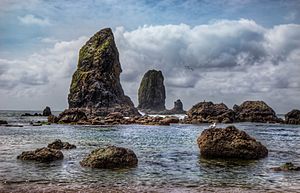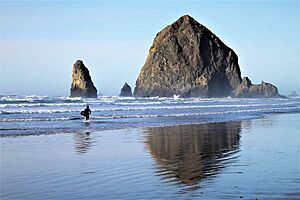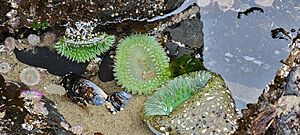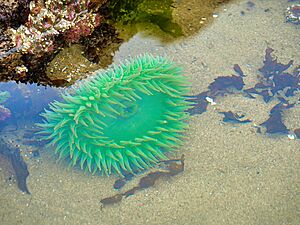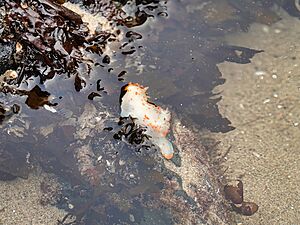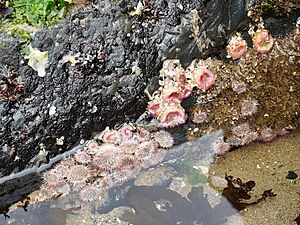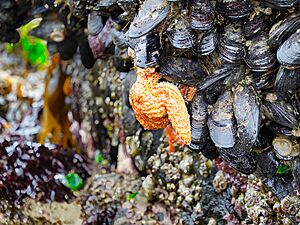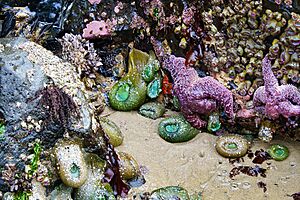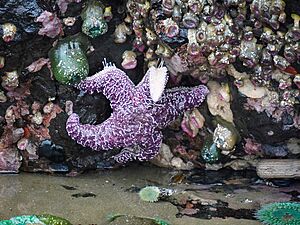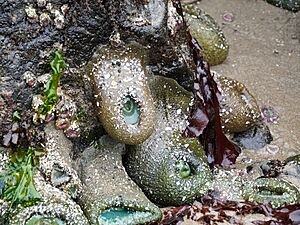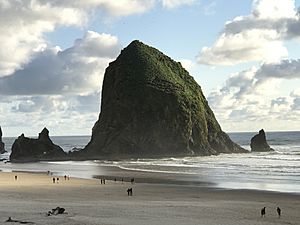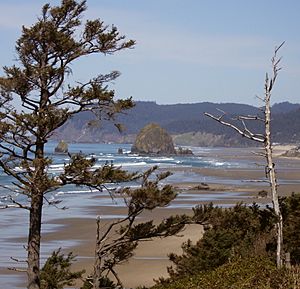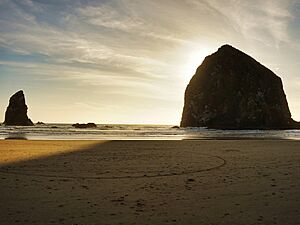Haystack Rock facts for kids
Quick facts for kids Haystack Rock |
|
|---|---|
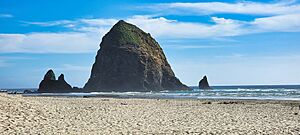
Haystack Rock and the Needles, Cannon Beach, 2023
|
|
| Location | Cannon Beach, Oregon |
| Coordinates | 45°53′4″N 123°58′5″W / 45.88444°N 123.96806°W |
| Offshore water bodies | Pacific Ocean |
| Elevation | 235 feet (72 m) |
| Formed by | Lava flows and erosion |
| Geology | Sea stack |
| Age | 15-16 million years |
| Operator | Various state and federal departments |
Haystack Rock is a giant rock that stands 235 feet (72 meters) tall in the ocean near Cannon Beach, Oregon. It's a type of rock formation called a sea stack. This huge rock is right next to the beach. You can even walk to it when the tide is low!
The areas around Haystack Rock, called tide pools, are full of amazing sea creatures. You can find starfish, sea anemones, crabs, and many other small animals living there. Haystack Rock is also a very important home for many sea birds, like terns and puffins, who build their nests there.
Contents
The Story of Haystack Rock
Haystack Rock has an interesting past. In 1968, a part of the rock that people used to climb was removed for safety reasons. Climbing on the rock is not allowed to protect the wildlife.
In 1990, Haystack Rock became a special "Marine Garden." This means it's a protected area where sea life can thrive. It's also part of the Oregon Islands National Wildlife Refuge. This makes it a safe place for animals and plants.
In July 2023, the rock was temporarily closed. This happened after a cougar (a type of wild cat) was seen climbing on it. It was likely looking for food. This was the first time a cougar had been seen on the rock.
Where is Haystack Rock?
Haystack Rock is located about 1.5 miles (2.4 km) south of downtown Cannon Beach, Oregon. Cannon Beach is in Clatsop County, Oregon. It's about 80 miles (129 km) west of Portland, Oregon. The main road nearby is U.S. Route 101 in Oregon. Haystack Rock is also part of the Tolovana Beach State Recreation Site.
Different groups help manage and protect Haystack Rock. The area below the average high water mark is managed by Oregon Parks and Recreation Department. The area above this line is managed by the United States Fish and Wildlife Service. They work together to keep the rock and its wildlife safe.
How Haystack Rock Was Formed
Haystack Rock is 235 feet (72 meters) tall. It is made of a dark rock called basalt. This rock was formed from ancient lava flows. These lava flows came from huge volcanic eruptions. They happened about 15 to 17 million years ago. These eruptions came from a place now known as the Yellowstone volcanic hotspot. They created many of the natural rock features along the Oregon coast.
Long ago, Haystack Rock was connected to the coastline. But over millions of years, wind and waves slowly wore away the land around it. This process, called erosion, separated the giant rock from the shore. Now it stands alone in the ocean. Three smaller rocks next to Haystack Rock are called "The Needles." Scientists think that Haystack Rock might completely erode away in about 2,000 to 3,000 years.
Amazing Animals and Plants
It is very important to protect the nature around Haystack Rock. Taking any plants or animals from the area is strictly against the rules. Also, climbing above the barnacle line (where the high tide usually reaches) is not allowed. This rule helps protect the birds that nest on the rock.
The City of Cannon Beach runs a special program called the Haystack Rock Awareness Program. They teach visitors about the rock's wildlife. These educational talks happen during low tide from February to October.
Many kinds of birds live and nest on the rock. These include pigeon guillemots, common murres, black oystercatchers, and tufted puffins. They usually raise their young between March and September.
Fun Things to Do at Haystack Rock
When the tide is low, visitors can explore the many tide pools around Haystack Rock. You can see lots of different marine animals living in their natural homes. The thin strip of sand and rock that connects Haystack Rock to the beach at low tide is perfect for exploring.
The area around the rock is a great place for many outdoor activities. People enjoy having picnics, flying kites, and watching birds. In 2023, about 350,000 people visited Haystack Rock. It's a very popular spot!
More Pictures of Haystack Rock
 | Emma Amos |
 | Edward Mitchell Bannister |
 | Larry D. Alexander |
 | Ernie Barnes |


